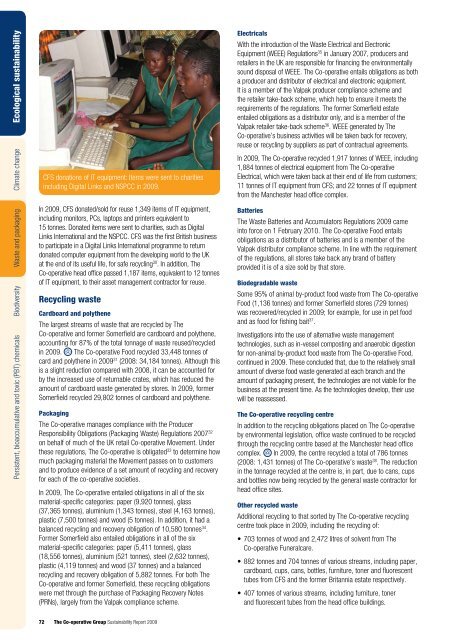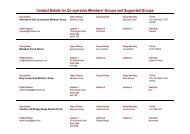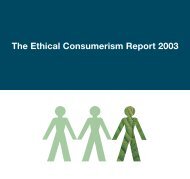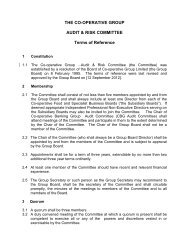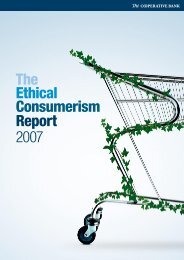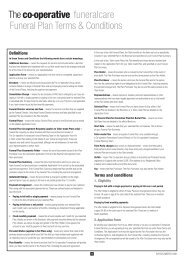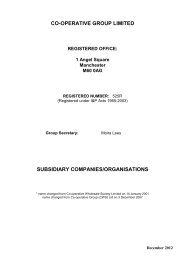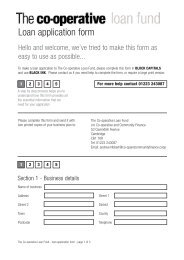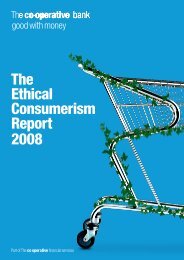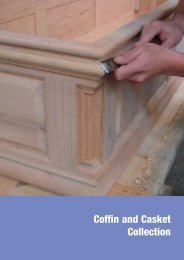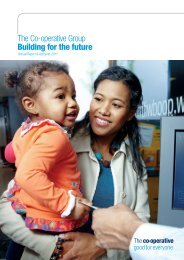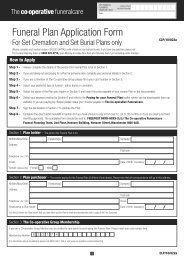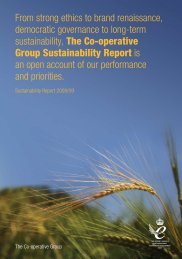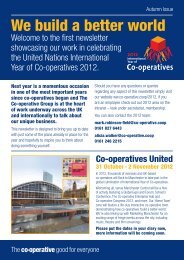Sustainability Report 2009 - The Co-operative
Sustainability Report 2009 - The Co-operative
Sustainability Report 2009 - The Co-operative
You also want an ePaper? Increase the reach of your titles
YUMPU automatically turns print PDFs into web optimized ePapers that Google loves.
Persistent, bioaccumulative and toxic (PBT) chemicals Biodiversity Waste and packaging Climate change Ecological sustainability<br />
CFS donations of IT equipment: Items were sent to charities<br />
including Digital Links and NSPCC in <strong>2009</strong>.<br />
In <strong>2009</strong>, CFS donated/sold for reuse 1,349 items of IT equipment,<br />
including monitors, PCs, laptops and printers equivalent to<br />
15 tonnes. Donated items were sent to charities, such as Digital<br />
Links International and the NSPCC. CFS was the first British business<br />
to participate in a Digital Links International programme to return<br />
donated computer equipment from the developing world to the UK<br />
at the end of its useful life, for safe recycling 30 . In addition, <strong>The</strong><br />
<strong>Co</strong>-<strong>operative</strong> head office passed 1,187 items, equivalent to 12 tonnes<br />
of IT equipment, to their asset management contractor for reuse.<br />
Recycling waste<br />
Cardboard and polythene<br />
<strong>The</strong> largest streams of waste that are recycled by <strong>The</strong><br />
<strong>Co</strong>-<strong>operative</strong> and former Somerfield are cardboard and polythene,<br />
accounting for 87% of the total tonnage of waste reused/recycled<br />
in <strong>2009</strong>. <strong>The</strong> <strong>Co</strong>-<strong>operative</strong> Food recycled 33,448 tonnes of<br />
card and polythene in <strong>2009</strong> 31 (2008: 34,184 tonnes). Although this<br />
is a slight reduction compared with 2008, it can be accounted for<br />
by the increased use of returnable crates, which has reduced the<br />
amount of cardboard waste generated by stores. In <strong>2009</strong>, former<br />
Somerfield recycled 29,802 tonnes of cardboard and polythene.<br />
Packaging<br />
<strong>The</strong> <strong>Co</strong>-<strong>operative</strong> manages compliance with the Producer<br />
Responsibility Obligations (Packaging Waste) Regulations 2007 32<br />
on behalf of much of the UK retail <strong>Co</strong>-<strong>operative</strong> Movement. Under<br />
these regulations, <strong>The</strong> <strong>Co</strong>-<strong>operative</strong> is obligated 33 to determine how<br />
much packaging material the Movement passes on to customers<br />
and to produce evidence of a set amount of recycling and recovery<br />
for each of the co-<strong>operative</strong> societies.<br />
In <strong>2009</strong>, <strong>The</strong> <strong>Co</strong>-<strong>operative</strong> entailed obligations in all of the six<br />
material-specific categories: paper (9,920 tonnes), glass<br />
(37,365 tonnes), aluminium (1,343 tonnes), steel (4,163 tonnes),<br />
plastic (7,500 tonnes) and wood (5 tonnes). In addition, it had a<br />
balanced recycling and recovery obligation of 10,580 tonnes 34 .<br />
Former Somerfield also entailed obligations in all of the six<br />
material-specific categories: paper (5,411 tonnes), glass<br />
(18,556 tonnes), aluminium (521 tonnes), steel (2,632 tonnes),<br />
plastic (4,119 tonnes) and wood (37 tonnes) and a balanced<br />
recycling and recovery obligation of 5,882 tonnes. For both <strong>The</strong><br />
<strong>Co</strong>-<strong>operative</strong> and former Somerfield, these recycling obligations<br />
were met through the purchase of Packaging Recovery Notes<br />
(PRNs), largely from the Valpak compliance scheme.<br />
Electricals<br />
With the introduction of the Waste Electrical and Electronic<br />
Equipment (WEEE) Regulations 35 in January 2007, producers and<br />
retailers in the UK are responsible for financing the environmentally<br />
sound disposal of WEEE. <strong>The</strong> <strong>Co</strong>-<strong>operative</strong> entails obligations as both<br />
a producer and distributor of electrical and electronic equipment.<br />
It is a member of the Valpak producer compliance scheme and<br />
the retailer take-back scheme, which help to ensure it meets the<br />
requirements of the regulations. <strong>The</strong> former Somerfield estate<br />
entailed obligations as a distributor only, and is a member of the<br />
Valpak retailer take-back scheme 36 . WEEE generated by <strong>The</strong><br />
<strong>Co</strong>-<strong>operative</strong>’s business activities will be taken back for recovery,<br />
reuse or recycling by suppliers as part of contractual agreements.<br />
In <strong>2009</strong>, <strong>The</strong> <strong>Co</strong>-<strong>operative</strong> recycled 1,917 tonnes of WEEE, including<br />
1,884 tonnes of electrical equipment from <strong>The</strong> <strong>Co</strong>-<strong>operative</strong><br />
Electrical, which were taken back at their end of life from customers;<br />
11 tonnes of IT equipment from CFS; and 22 tonnes of IT equipment<br />
from the Manchester head office complex.<br />
Batteries<br />
<strong>The</strong> Waste Batteries and Accumulators Regulations <strong>2009</strong> came<br />
into force on 1 February 2010. <strong>The</strong> <strong>Co</strong>-<strong>operative</strong> Food entails<br />
obligations as a distributor of batteries and is a member of the<br />
Valpak distributor compliance scheme. In line with the requirement<br />
of the regulations, all stores take back any brand of battery<br />
provided it is of a size sold by that store.<br />
Biodegradable waste<br />
Some 95% of animal by-product food waste from <strong>The</strong> <strong>Co</strong>-<strong>operative</strong><br />
Food (1,136 tonnes) and former Somerfield stores (729 tonnes)<br />
was recovered/recycled in <strong>2009</strong>; for example, for use in pet food<br />
and as food for fishing bait 37 .<br />
Investigations into the use of alternative waste management<br />
technologies, such as in-vessel composting and anaerobic digestion<br />
for non-animal by-product food waste from <strong>The</strong> <strong>Co</strong>-<strong>operative</strong> Food,<br />
continued in <strong>2009</strong>. <strong>The</strong>se concluded that, due to the relatively small<br />
amount of diverse food waste generated at each branch and the<br />
amount of packaging present, the technologies are not viable for the<br />
business at the present time. As the technologies develop, their use<br />
will be reassessed.<br />
<strong>The</strong> <strong>Co</strong>-<strong>operative</strong> recycling centre<br />
In addition to the recycling obligations placed on <strong>The</strong> <strong>Co</strong>-<strong>operative</strong><br />
by environmental legislation, office waste continued to be recycled<br />
through the recycling centre based at the Manchester head office<br />
complex. In <strong>2009</strong>, the centre recycled a total of 786 tonnes<br />
(2008: 1,431 tonnes) of <strong>The</strong> <strong>Co</strong>-<strong>operative</strong>’s waste 38 . <strong>The</strong> reduction<br />
in the tonnage recycled at the centre is, in part, due to cans, cups<br />
and bottles now being recycled by the general waste contractor for<br />
head office sites.<br />
Other recycled waste<br />
Additional recycling to that sorted by <strong>The</strong> <strong>Co</strong>-<strong>operative</strong> recycling<br />
centre took place in <strong>2009</strong>, including the recycling of:<br />
• 703 tonnes of wood and 2,472 litres of solvent from <strong>The</strong><br />
<strong>Co</strong>-<strong>operative</strong> Funeralcare.<br />
• 882 tonnes and 704 tonnes of various streams, including paper,<br />
cardboard, cups, cans, bottles, furniture, toner and fluorescent<br />
tubes from CFS and the former Britannia estate respectively.<br />
• 407 tonnes of various streams, including furniture, toner<br />
and fluorescent tubes from the head office buildings.<br />
72<br />
<strong>The</strong> <strong>Co</strong>-<strong>operative</strong> Group <strong>Sustainability</strong> <strong>Report</strong> <strong>2009</strong>


